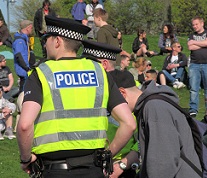Police Prejudice Exposed In Stop-and-Search Figures
Police Prejudice Exposed In Stop-and-Search Figures

New stop-and-search figures composed by The Independent have revealed the extent of ongoing police prejudice, despite concerted efforts to tackle the problem. Data compiled from 39 police forces across the country has revealed that in some areas, a black person is up to 17.5 times more likely to be stopped and searched than a white person, with racial partiality not only prevalent in inner-city areas, but also across rural communities.
Black people targeted above any other ethnic group
Analysis of police figures by The Independent has revealed that in 36 of 39 police forces across the UK, black people are targeted more than their fellow white citizens when the powers of stop-and-search are exercised. Despite warnings by Home Secretary Theresa May that she is prepared to legislate to curb the “excessive and disproportionate” use of the power, the force-by-force analysis revealed that black people are still far more likely than other ethnic groups to be subject to its exercise.
In Dorset, the statistics showed that a black person was 17.5 times more likely to be stopped than a white person, and that in less than a quarter of cases where the power was used, did an arrest follow. As the force with the biggest disparity, stop-and-search was used on 200 occasions on black people in Dorset between December 2014 and April 2015, despite the latest census figures showing that just 3,200 black people live in the county. Comparatively, over the same period 2,549 were conducted on Dorset’s white population of 714,600. The force attributed the inequality to operations against drug gangs, to the black population in the area being underestimated, and the potential for the power to have been exercised on visitors.
In Sussex, the ratio was 10.5, while the chance of a black person being targeted above a white person was 8.4 times higher in Norfolk, 7.6 times higher in Warwickshire and 7.3 times more likely in Surrey. The bias was also highlighted in the country’s biggest cities, with the ratio revealed as 3.2 in London, 3.0 in the West Midlands and 2.6 in Manchester. However, in Lincolnshire, Merseyside and Humberside, the situation was reversed, with white people more likely to be searched.
“There is no explanation offered that provides a justification”
The figures have led to warnings that the continued “racial bias” shown by police could harm relations with minority communities. Isabella Sankey, policy director for Liberty – the campaign group for civil liberties and human rights, said the data was concerning 16 years after the Macpherson report into the investigation into the murder of Stephen Lawrence denounced “institutional racism” in the Met and other forces across the country. She said:
“An overall reduction in the number of stop and searches is welcome, but while such racial bias continues, distrust between the police and the communities they are supposed to serve will only grow.”
Taher Gulamhussein, spokesman for the campaign group StopWatch, agreed, stating:
“The level of racial disparity is unfair. There is no explanation offered that provides a justification. With the majority of searches resulting in no arrest or other police outcome, this highlights that most searches were fruitless and therefore not an effective use of police time.”
The Government has already outlined its commitment to curb the use of stop-and-search powers, and following the revelation of the analysis, Teresa May said the publication of the figures was “a further step forward in the Government’s commitment to increasing the transparency of the police and ensuring the public can hold their force to account”.
Jack Dromey, the shadow policing minister, said: “It cannot be right that if you are black you are much more likely to be stopped and searched than if you are white. If done without justification, it is potentially unlawful and certainly damaging to the confidence of black people in the police.
To the credit of the leadership of the police, great efforts to get the balance right are under way but these disturbing statistics demonstrate there is a long way to go yet.”
Criminal defence solicitors
Here at IBB we understand how distressing being accused of a crime can be, particularly if you have never been in trouble with the law before. Our defence solicitors are there to immediately provide you with the reassurance you need, and our multi-disciplinary teams can tackle situations that have both criminal and commercial aspects.
Our criminal law team are experts in defending clients who have been accused of a wide range of charges including road traffic offences, theft, deception, murder, fraud and money laundering. We have also dealt with investigations brought by a variety of enforcement organisations including the Health & Safety Executive, the FSA, HMRC, Trading Standards and the OFT.
Call us now in complete confidence on 03456 381381 or for 24-hour immediate emergency representation, on 0330 999 4999. You can also contact us free via Whatsapp on 07899 953415 or Blackberry messenger: PIN 287DA137
